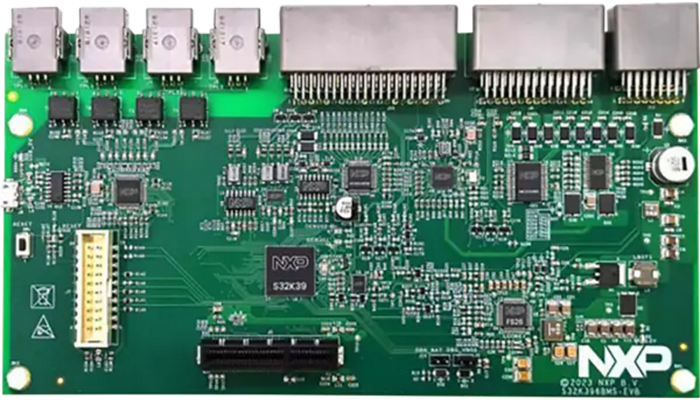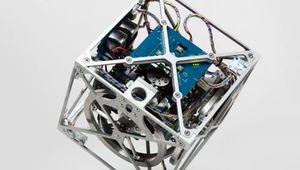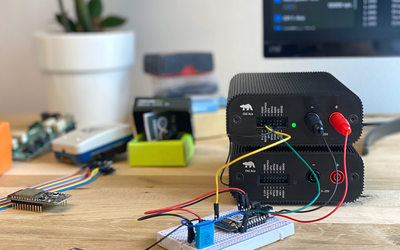NXP Semiconductors S32K396BMS-EVB Evaluation Board
Evaluation board used to demonstrate an integrated Electronic Control Unit (ECU) solution.
Technical Specifications
| Product | Evaluation Board |
| Type | Battery Management |
| For Evaluation Of | S32K396 |
| Supports I/O Interfaces | MSDI, ADC, GPIO, LSD, and HSD |
| Applications | Automotive, Battery Management Systems (BMS) |
Overview
The S32K396BMS from NXP Semiconductors is an evaluation board designed to demonstrate integrated Electronic Control Unit (ECU) solutions, mainly focusing on battery management systems (BMS) and vehicle control units (VCU). This board monitors critical parameters such as battery voltage, temperature, and fault status. Simultaneously, it facilitates the emulation of vehicle conditions like pedal positioning and gear through the VCU samples. Equipped with the S32K37 electrification MCU, the board supports extensive hardware and software development activities using NXP's Real-Time Drivers (RTD). The board is further enhanced with the FS2633 system basis chip for power supply and safety, meeting ASIL-D standards, and the PCA2131TF automotive Real-Time Clock/calendar with alarm functionality, enhancing its utility in automotive applications.
S32K396BMS Evaluation Board Features
Let’s discuss the technical aspects and features that make the S32K396BMS Evaluation Board a unique choice for engineers to evaluate, prototype, and refine their BMS and VCU designs.
Consolidated BMS and VCU Development
Traditionally, BMS and VCU functionalities have resided in separate ECUs within an electric vehicle. The S32K396BMS-EVB breaks this mold by offering a single platform to evaluate and develop a combined BMS and VCU solution. This eliminates the need for separate modules, simplifying system design and reducing overall system complexity. The board integrates features for:
Battery Management System (BMS): It can monitor critical battery parameters like voltage, temperature, and fault status, ensuring safe and efficient battery operation.
Vehicle Control Unit (VCU): The VCU section can simulate various vehicle inputs like pedal position and gear selection, allowing for realistic testing and validation of control algorithms. This enables developers to test and optimize BMS responses under different driving conditions.
This combined functionality makes the S32K396BMS-EVB ideal for developing and evaluating control strategies for battery-powered vehicles.
Extensive Communication and Interface Options
The S32K396BMS-EVB has robust communication interfaces, including MSDI, ADC, GPIO, LSD, and HSD. This extensive selection enables seamless communication between components within the ECU and external systems. The board also features an MC33665 communication gateway and TPL transceiver, facilitating the daisy-chaining of multiple Battery Cell Controllers (BCCs) using the MC33774 communication protocol. This setup is pivotal for expanding system capabilities without compromising communication efficiency or speed.
The S32K396BMS-EVB boasts a wide range of input/output (I/O) options, including switch-to-ground inputs, programmable switch inputs, and multiple high-side and low-side switches. Beyond these standard interfaces, the S32K396BMS-EVB incorporates a 100BASE-T1 Ethernet interface, enabling high-speed communication with external systems for data logging, diagnostics, and remote monitoring. Additionally, the board includes Controller Area Network (CAN) interfaces, a Local Interconnect Network (LIN) interface, and a Low-Power Universal Asynchronous Receiver/Transmitter (UART) interface. These diverse communication options allow developers to integrate the BMS and VCU seamlessly into existing vehicle networks.
Powerful Microcontroller, Safety Features, and Real-Time Functionality
At the heart of the S32K396BMS-EVB lies the S32K396 microcontroller, a powerful processing unit specifically designed for automotive applications. The board incorporates several features that ensure safe and reliable operation:
FS2633 (ASIL-D) System Basis Chip (SBC): This chip provides a robust power supply for the board and integrates safety features crucial for automotive applications, adhering to the highest safety integrity level (ASIL-D).
PCA2131TF Automotive Real-Time Clock/Calendar: This component ensures accurate timekeeping and offers alarm functionality, vital for data logging and system synchronization within the BMS and VCU.
Applications
The S32K396BMS-EVB Evaluation Board offers robust, reliable, and flexible solutions for automotive electronics developers. This board simplifies the creation of integrated BMS and VCU solutions. The EVB precisely tracks voltage, temperature, and fault status, ensuring battery safety and efficiency. Realistic simulation of pedal position, gear selection, and other inputs allows for thorough VCU algorithm testing. By combining BMS and VCU functionalities, the EVB reduces system complexity and cost. With its powerful features and focus on safety, the S32K396BMS EVB empowers engineers to create next-generation electric vehicle battery management systems.
Where to find it

Mouser Electronics
Mouser Electronics is a worldwide leading authorized distributor of semiconductors and electronic components.
References
Recommended Specs
Continue Reading
Optimizing Battery Performance: Advanced Management Systems for Enhanced Safety, Efficiency, and Utilization
Several technologies have suddenly come into the spotlight in measures against global warming. Typical examples of these technologies include solar and wind power generation, electric vehicles (EVs), power semiconductors, and fuel cells.












